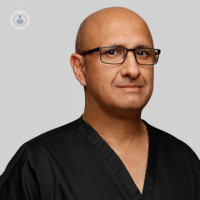Haemorrhoids: When should I see a doctor?
Written in association with:Haemorrhoids, also known as piles, are a very common colorectal problem that can be painful and uncomfortable to manage.
Here to provide an expert insight into haemorrhoids, including causes, symptoms and treatment, is Mr Tushar Agarwal, renowned consultant colorectal surgeon.

How do haemorrhoids form?
Haemorrhoids are cushions of blood vessels that are found inside and around the anus, attached to the anal canal wall by several fibres. Everyone has them.
Over a period of time, however, straining can cause the fibres to break, which leads to the cushions dropping down from the anal canal wall. These cushions are now considered “haemorrhoids”. Haemorrhoids can drop down, pop out, or burst and bleed if there is too much pressure within them.
Will I notice haemorrhoids myself?
Yes, people do tend to notice haemorrhoids, which might be felt as lumps inside and around the bottom. Obviously, it is best to get these symptoms checked out to make sure it is haemorrhoids and not something else.
When should I see a doctor for haemorrhoids?
I think people should get checked out as soon as they start having symptoms. These symptoms are usually lumps around the bottom and rectal bleeding, and it is useful to be absolutely sure that it is haemorrhoids and not something else.
Once a diagnosis of haemorrhoids has been established and all other conditions that could contribute to the same symptoms have been ruled out, then it is a question of managing haemorrhoids. If symptoms are well-managed by conservative measures, then obviously that is all well and good. However, if symptoms get worse, then it is advisable to see a doctor again.
If haemorrhoids are left untreated, can they become serious?
Usually not. There is a lot of anxiety concerning haemorrhoids that are left untreated and if these can turn into cancer. However, the short answer is no; haemorrhoids will not turn into cancer.
Haemorrhoids can remain symptomatic, and if they are constantly bleeding, then this can cause a person’s blood count to start dropping. Otherwise, however, no harm usually comes to people who have haemorrhoids as long as their symptoms are well-controlled.
Should haemorrhoids be immediately removed or treated?
Again, no, haemorrhoids do not need to be treated unless they are causing symptoms.
As far as removing is concerned, haemorrhoids are only removed if it is absolutely necessary. Lesser invasive treatment options for haemorrhoids are preferred. This is because the removal of haemorrhoids is a painful operation that, like with any surgical procedure, is associated with potential risks and complications. Thus, it is best to avoid removing haemorrhoids unless absolutely necessary.
In conclusion, haemorrhoids do not need to be immediately treated or removed. It depends on the symptoms.
Mr Tushar Agarwal is a renowned colorectal surgeon with over 30 years’ experience who specialises in a range of proctology procedures, such as surgery for haemorrhoids.
If you suspect haemorrhoids and require expert assistance and treatment, do not hesitate to book an appointment with Mr Agarwal via his Top Doctors profile today.


